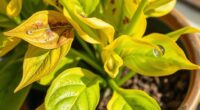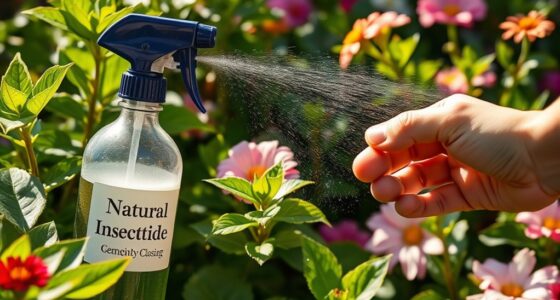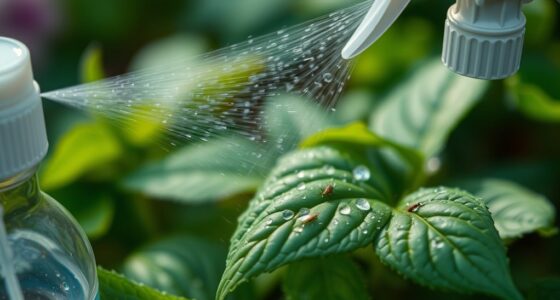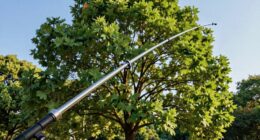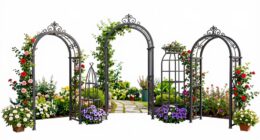To use neem oil safely on your plants, dilute it according to the manufacturer’s instructions, usually 1-2 tablespoons per gallon of water with a bit of dish soap for even coverage. Always test on a small area first and spray during cooler times like early morning or late evening to prevent leaf burn. Water plants before application and avoid overdoing it to protect beneficial insects. Keep these tips in mind, and you’ll discover more ways to get the best results.
Key Takeaways
- Always dilute neem oil according to manufacturer instructions and add mild dish soap for even coverage.
- Test on a small plant area before full application to prevent potential leaf damage.
- Apply during early morning or late evening to minimize leaf burn and protect beneficial insects.
- Avoid overapplication; follow recommended weekly treatments during active pest seasons.
- Water plants thoroughly before spraying to enhance safety and reduce plant stress.
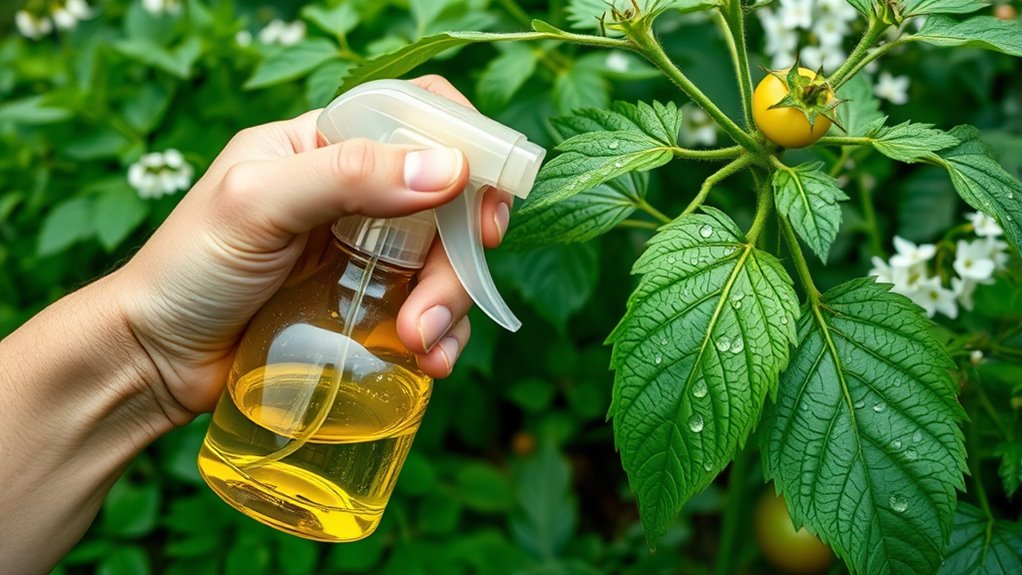
Ever wonder how neem oil has become a powerhouse in natural pest control and skincare? It’s because this versatile oil offers a safe, effective way to protect your plants while supporting organic gardening practices. When used properly, neem oil can control a wide range of pests without the harsh chemicals found in conventional pesticides. Its natural properties make it a favorite among gardeners committed to sustainable methods, helping you maintain healthy, thriving plants without compromising the environment.
In pest control, neem oil works by disrupting the life cycle of insects. It contains azadirachtin, a compound that interferes with feeding, growth, and reproduction, ultimately reducing pest populations. You’ll find it particularly helpful against aphids, whiteflies, spider mites, and beetles. It’s important to understand that neem oil doesn’t instantly kill pests; instead, it acts as a repellent and growth regulator, making pests less likely to reproduce and feed on your plants. This gradual approach means you can often manage pest issues with fewer applications and less harm to beneficial insects like bees and ladybugs.
Using neem oil in your organic gardening routine is straightforward, but you do need to follow some safety guidelines to ensure you get the best results without harming your plants or yourself. First, always dilute the oil according to the manufacturer’s instructions. A common mix is about one to two tablespoons of neem oil per gallon of water, with a few drops of mild dish soap to act as an emulsifier. This helps the oil distribute evenly on plant surfaces. Before applying broadly, test the solution on a small part of your plant to check for any adverse reactions. Apply the neem oil during early morning or late evening to avoid leaf burn caused by direct sunlight.
Regular applications are key, especially during active pest seasons, but avoid overdoing it. Most pests are manageable with weekly treatments, but if you notice beneficial insects or pollinators visiting your plants, try to time applications to minimize their exposure. Remember, neem oil is safe for most plants and organic gardening methods when used correctly, but overapplication can lead to leaf damage or phytotoxicity. Keep your plants healthy by watering them well beforehand, and avoid spraying during extreme heat or stress conditions. Additionally, choosing pinball machines that are lightweight and easy to move can help prevent damage during application or maintenance.
Frequently Asked Questions
Can Neem Oil Harm Beneficial Insects in My Garden?
You might wonder if neem oil harms beneficial insects in your garden. While neem oil offers beneficial insect safety when used correctly, it can be toxic to some beneficial insects if applied directly or during their active hours. To minimize neem oil toxicity, apply it early in the morning or late evening, and avoid spraying when beneficial insects are present. Proper timing and careful application protect your helpful garden allies.
How Often Should I Apply Neem Oil to My Plants?
Applying neem oil is like tuning an instrument—you want to do it just enough to keep everything in harmony. Generally, you should apply neem oil every 7 to 14 days, depending on pest pressure and plant health. Over-application can cause harm, so monitor your plants closely. Regular, spaced-out treatments help manage pests effectively without stressing your plants or harming beneficial insects.
Is Neem Oil Safe for Edible Plants and Fruits?
You wonder if neem oil is safe for edible plants and fruits. Generally, neem oil is considered safe for edible plants when used properly, but you should be cautious of neem oil toxicity. Always follow the instructions, especially regarding harvest intervals, to guarantee edible plant safety. Avoid over-application, and wash fruits thoroughly before consumption to minimize any potential risks. Proper use helps protect your plants without compromising safety.
What Is the Best Time of Day to Apply Neem Oil?
Imagine catching the perfect moment for application timing—this is vital with neem oil. You should apply it early in the morning or late in the evening when environmental conditions are calm and temperatures are moderate. This prevents leaf burn and guarantees better absorption. Avoid applying during the heat of the day or when rain is imminent. The right timing maximizes effectiveness while protecting your plants.
Are There Any Plants That Should Not Be Treated With Neem Oil?
Some plants are sensitive to neem oil, so you should avoid treating them to prevent damage. Plants like succulents, ferns, and certain flowering species may have neem oil restrictions because they react poorly to it. Always check if your plant is listed as sensitive before applying neem oil. If unsure, do a patch test or consult specific care guidelines to make certain you don’t harm your plants.
Conclusion
In brief, balance your benefits with careful precautions when using neem oil. By following simple steps, you’ll shield your shrubs, safeguard your seedlings, and strengthen your succulents. Remember, moderation and mindful application make magic happen. So, stay safe, stay savvy, and let neem oil nurture naturally. With wise usage, your plants will thrive, transforming your garden into a lush, lively landscape. Happy gardening!

